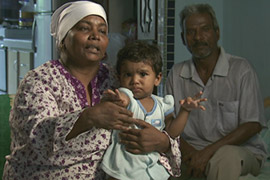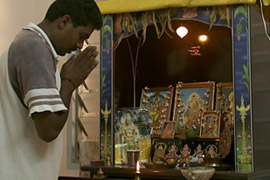Malaysian family split by faith
Apostasy case casts light on country’s fragile racial and religious balance.

Published On 7 May 2007
Born as Siti Fatimah to a Muslim family, Revathi initially sought to legally change her name before deciding to marry the man she loved, Suresh Veerapan, in a Hindu rite in 2004.
Divya, was born about a year later.
But Malaysian law does not recognise marriages between Muslims and non-Muslims and in March religious officials, acting within Malaysian law, removed the child from Suresh’s home and handed her over to Revathi’s family.
Rehabilitation
The case began six years ago when Malaysian officials rejected Revathi’s application to drop her Muslim name saying she needed a letter of approval from the religious authority in Malacca, her home state.
 |
| Suresh says his wife is no longer a Muslim |
Unable to make any headway, Revathi and Suresh eventually went ahead with a marriage ceremony at a Hindu temple.
But early in January this year, she was charged with apostasy and ordered by the Malacca state shariah court to be detained for 100 days at the Ulu Yam Faith Rehabilitation Centre on the outskirts of Kuala Lumpur.
According to its website, the centre aims to correct wayward Muslims including apostates, religious deviants and women carrying the children of non-Muslim partners.
The shariah court also barred Suresh, a bus driver, from visiting her.
“My heart is torn,” Suresh told Al Jazeera. “After all, she is not a Muslim. She is only Muslim by name, but she has been living as a Hindu.”
Contentious
The bone of contention before the the shariah court hearing was whether Revathi grew up as a Muslim or a Hindu, with opposing claims by her grandparents from both sides.
In the meantime, Revathi’s detention period has been extended for another 80 days.
A court spokesman contacted this week confirmed the extension order but declined to comment on grounds that his remarks could be prejudicial to proceedings.
“I can’t give you any information at this point in time because the case is still pending in court,” he told Al Jazeera.
Similarly, Malacca religious enforcement officers refused to comment and asked for queries to be directed to the Malacca Islamic Affairs Council, who could not be reached.
In Malaysia, the administration of Islamic law is the responsibility of individual states but where there is a conflict with federal laws, the constitution as the supreme law of the land prevails.
Custody
 |
| Revathi’s Muslim parents are seeking custody of Divya Darshini |
Harussani Zakaria, religious advisor to another Malaysian state – Perak in the north of the country – said under traditional Islamic law cases of apostasy are punishable by death.
But as Malaysian law does not provide the death penalty for apostasy, he said the government should consider an alternative law to deter Muslims from renouncing their faith.
Revathi’s parents have since sought a shariah court order for custody of their granddaughter, whom they have vowed to raise as a Muslim.
“I will make her a Muslim child,” said Zaleha, Revathi’s mother.
“That’s why I took her… to correct her upbringing. After all, her mother has no choice. Her mother cannot leave this religion anyway.”
Zaleha said they disapproved of Revathi’s Hindu marriage and had tried to dissuade her from going through with it.
“She asked me if I can allow her to convert out of Islam. I said no way, you must remain in the religion. You cannot leave, it’s the law here.”
Detention
Despite being denied visitation rights, Suresh still regularly makes the three-hour drive to the detention center hoping to persuade the guards to allow him to see his wife.
 |
| Suresh wants custody of his daughter who is with Revathi’s Muslim parents |
On an earlier trip, Suresh said he had been asked to prove that Revathi was his wife given her legal religious status.
“‘She’s a Muslim, you’re a Hindu. How can you prove that she’s your wife?'” he said, relating the conversation with one of the officers at the facility.
Speaking through the center’s gate, Revathi told Suresh she had not eaten in days and has been suffering from asthma attacks, and had no access to medication.
Suresh says he will apply for custody of their daughter and raise her as a Hindu.
Freedom
The conflict stems from Malaysia’s constitution which says Islamic law applies exclusively to Muslims, but which guarantees religious freedom for all Malaysian citizens.
Since coming to power Abdullah Ahmad Badawi, the prime minister, has been promoting his concept of Islam Hadhari, or civilisational Islam, as the ideal practice for a multi-ethnic nation such as Malaysia, where over 30 per cent of the population is non-Muslim.
Abdullah says the concept acts as a bridge between the West and the Muslim world by observing moderation and equality, saying these are key to establishing good governance in any plural and modern society.
In the last five years, however, numerous cases such as Revathi’s have emerged, often posing a constitutional challenge to the country’s judiciary.
Prof Dr Shad Saleem Faruqi, a constitutional law expert, says there is “very little doubt” that Article 11 of the constitution allows all, including Muslims, the freedom of conscience.
“Arresting people for their religious belief, besides being a violation of Article 11, would be a violation of their personal liberties,” he said.
Source: Al Jazeera